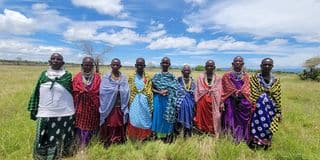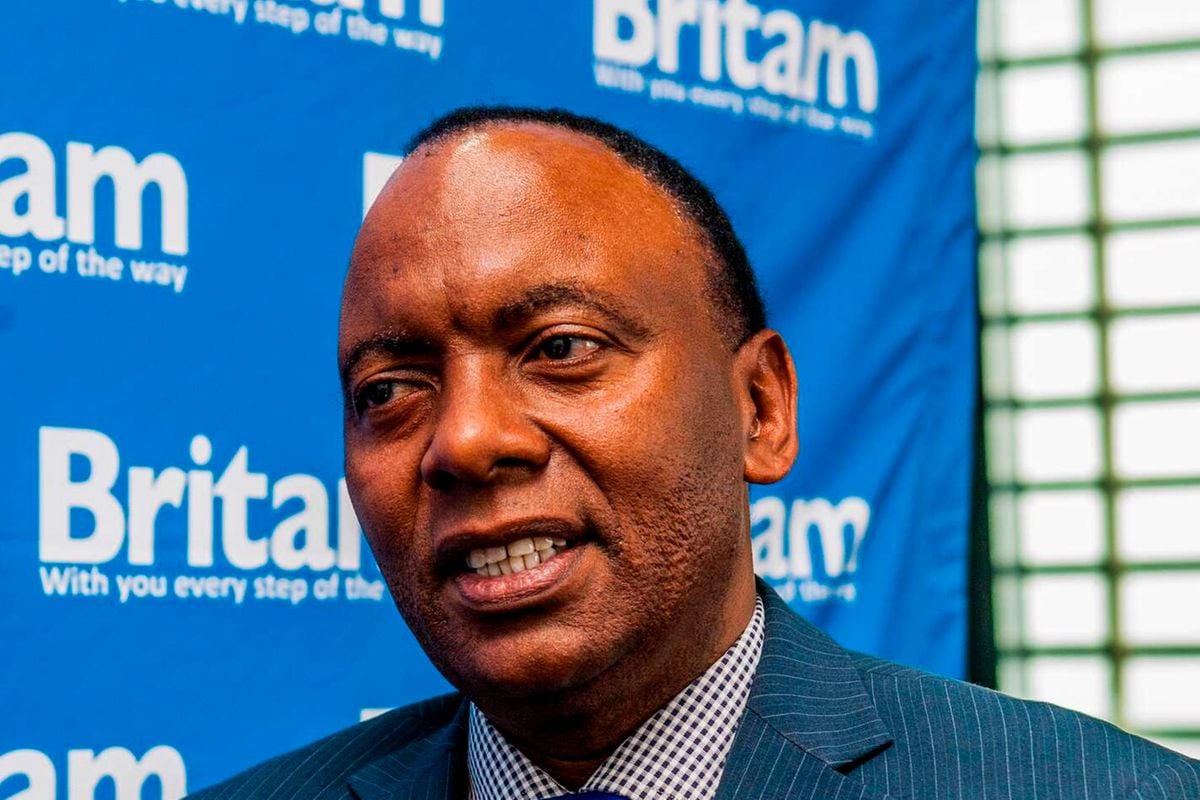Arusha, Manyara. In the past years, women in pastoralist communities, especially the Maasai, were not actively involved in income-generating activities or supporting their families with their daily needs. This was acknowledged by women in the districts of Simanjiro and Mombuli when speaking to Mwananchi.
Unlike many areas in the past, in the village of Oloswaki-Simanjiro, despite experiencing moderate drought, indicating a lack of rain for at least three weeks, one house was surrounded by greenery with lush grass and various trees.
This is the home of Vaileth Kadogo. Behind the house lies a garden of about a quarter hectare, cultivated with several mounds of potatoes and other types of vegetables, cassava, and well-standing banana trees.
In that area, there were also short ridges being prepared, indicating that certain seedlings would be planted there soon.
“Those ridges used to be for vegetables, but now I want to prepare them for potatoes because of the rain; it’s still raining,” Ms Vaileth said.
The mother of five children explained that the beds they use for planting are not ordinary; they have various layers that help conserve water. “We dig a hole several feet deep; we put in leaves, manure, and soil in different layers,” she said.
Ms Vaileth noted that the garden significantly supports her family; during the dry season, they sell vegetables, and they use some at home.
“The education we received from stakeholders, especially TACCEI (a non-governmental organisation), on utilising small plots of land and scarce water has been successful. I sell vegetables and earn between Sh2,000 and Sh5,000 a day. I buy notebooks for the children, and I help my husband,” she said.
In another village, Oloswaki, a group of 19 women gather for a meeting. Speaking to them, they said they came from villages such as Terrat, the neighbourhood of Ololulung’a in Engonongoi village, and some from Oloswaki itself.
“This is a meeting of our rotating savings and credit group (Kikoba); we do this at least once a week,” said Nairukoki Tauta, who is the leader of the group.
Ms Nairukoki explained that due to the harsh living conditions resulting from the drought affecting both livestock and farming, leading to a scarcity of grazing land for livestock and difficulties in cultivating crops, they decided to come together as a group of 20 women.
“In the past, we used to stay at home, solely relying on our husbands. But as the situation became tough, we realised the need to actively contribute to our families’ well-being. Hence, we came together and established this rotating savings and credit group,” she said.
“We started by each contributing Sh2,000, and then we gave it to one person, so each person received an average of Sh30,000. We use this money to engage in small businesses such as selling sugar, petrol, snacks, and others,” Nairukoki added. She further mentioned that their businesses were initially affected by the small capital, but later their capital increased after receiving a loan of Sh1,000,000 from TACCEI.
The leader explained that after increasing their capital, they could lend each other more than Sh100,000 with favourable repayment terms, which doubled their capital. They are currently working on repaying the one million they borrowed.
Ms Esupati Tajiri, one of the women in the group, said she uses the money to trade in soap and sugar. “I started with 10 kilogrammes of sugar and 5 kilogrammes of soap. I sell to my neighbours in the town and village, and I can make repayments,” she said.
Another member, Maitapuaki Lukas, who has five children, said, “Now I can even buy school notebooks and uniforms for my children. In the past, we relied solely on my husband. The soap and notebook business has helped me a lot.”
Director of TACCEI, Justin Robert Lukumay, said: “We felt compelled to think of ways to assist our fellow community members because this is our community, and we have all been affected by climate change.” Mr Justin said they provided education and assistance to the women because they had often been left behind.
This sentiment was echoed by the chairman of Terrat Village, Kone Medukenya, who stated that women are more affected and that it is easier for a man to leave his family than for a woman to do so, noting that the establishment of lending groups has been significant for this vital segment of society.
Village Executive Officer (VEO) of Oloswaki, Lairorie Ormemei, said, “We support institutions that aid and endorse our efforts because, as a village government, we have plans to plant at least five trees per household every year. Environmental conservation education should continue because our communities have lagged behind for too long.”
In Esilalei ward, Monduli district, women are in their own grass farm which they have planted and tended to. The grass are expected to be sold during the dry season, and they have already started selling seeds. PHOTO | HALILI LETEA
The situation is not much different for women in Monduli District, Losirwa village in Esilalei ward, where a group of women from a pastoralist community engaged in a grass cultivation project.
“We started this project at the end of last year after the village allocated us an area,” said Grace Narumuta, the leader of the group consisting of 25 women and five men. In an open area or savanna with several trees where the eyes can perceive, there is a distinct fenced-off section surrounded by thorny bushes. This is where the 14-acre garden is located.
The grass inside the fenced area grows taller, reaching knee height or more compared to outside the fence. According to Grace, they are still maintaining the area, and they will begin selling the grass in the dry season. Currently, they are able to collect seeds and sell them for some fully-fledged grasses.
“We harvested over four kilogrammemes of seeds and sold each kilogramme for Sh25,000 on International Women’s Day (March 8) to other groups. This business has shown us a ray of hope,” she said.
Ms Grace also mentioned that, besides the grass project, their group has another project of rotating savings and engaging in small businesses.
She added that “in these groups, we assist each other; for instance, if a student needs money for school, we can provide them with some assistance, and if they are from a group member, we may exempt them from repayment because we have a community fund.”.
Meanwhile, in some houses in Esilalei, there was a certain style of rainwater harvesting, with several water tanks installed. Here I met Dora Kilimbe, who said, “We used to suffer a lot from drought, but we received education on rainwater harvesting, and with the tanks we have, we can store water that can last up to five months for our families and some neighbours.”
They obtained education on water conservation, lending groups, and rainwater harvesting from the Pastoral Women Council (PWC) organization. This prompted me to seek out Stella James, who is the project manager at PWC in Monduli District.
“We sought out experts to provide education to these groups, but we also contribute based on our knowledge. This is our home; we have grown up in these environments and have learned and seen how climate change has affected us,” said Ms Stella.
She added that there are four grass planting groups in the district, with over 44 hectares planted and preserved, while there are 12 groups consisting of 30 members each that are involving themselves in saving and lending activities.
The chairman of Loswira village, Yamat Laizer, said: “The village continues to support these efforts, which is why we provided open areas for groups to cultivate grass. There are still areas available, and we will continue to provide them to others to ensure our area remains safe.”
The government is supporting these groups in various ways.
Speaking about uplifting women in pastoralist communities, the Regional Administrative Secretary (RAS) of Arusha, Missaile Musa, mentioned that after the government reinstated the 10 percent loan allocation, which will begin next fiscal year, each council has developed a mobilisation plan for these groups.
“In collaboration with development departments, ward councils, and councillors in each council, we have already started a mobilisation campaign,” he said.
He added that the aim of this campaign is to prepare them so that those who receive the funds can invest them wisely for their benefit.
The District Commissioner of Simanjiro, Faki Lulandala, stated that in their district, many economic activities other than livestock keeping are taking place, and the dependency on livestock keeping is not as significant.
He mentioned activities such as mining, trade, and fishing.
He further explained that they have begun preparing citizens, especially women, regarding the criteria for obtaining these loans and the activities they will engage in.
“They are waiting for the fiscal year, and currently, there are those who have already started applying,” he said.
Supported by the Bill & Melinda Gates Foundation
















